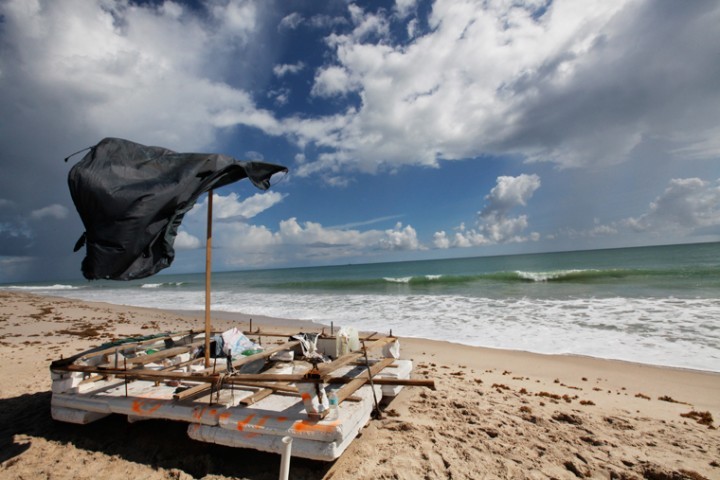
VERO BEACH — A boat – apparently used by Cuban refugees to escape their island homeland – washed up on the barrier island Friday although none of its passengers were on the fragile vessel.
Coast Guard officials in Miami said this week they deal with so many vessels they’d have to comb their records to determine if the boat was stopped and its passengers off loaded.
An orange mark on the back of the boat indicates the vessel might have been tagged by the Coast Guard.
A Coast Guard spokeswoman said landings are usual this far north although she pointed out three lands occurred between Fort Pierce and Jupiter in June.
Over the weekend, the small handmade vessel sat on water’s edge just south of the Moorings. It was still there when Vero Beach 32963 went to press.
Plenty of people stopped to get a closer look. They’ve called neighbors to come down and see the boat. They’ve stopped to have their photos taken near it.
And they have stopped to reflect.
Various brands of Cuban chips, candies, colas, beer, cigarettes and water were packed into the boat as the unknown men and possibly women apparently headed to sea in a boat cobbled together with 1- by 6-inches boards and Styrofoam panels jammed between its wooden ribs.
The boat measured in at 14-feet long by 7-feet wide. The mast made out of a 2- by 2-inche post rose nine feet into the air. A black tarp served as the sail and the tiny craft featured a homemade boom and rudder.
“They must be pretty desperate – those poor people,” said Peter Tyson of St. Christopher Lane.
Over the past decade, a few vessels have washed ashore, some with motors and others much more primitive: inner tubes and sticks.
By comparison, last week’s find was pretty ingenious and thought provoking.
“It’s kind of unique,” said Tyson.
By the time the boat washed ashore, it already had the telltale signs that it had been intercepted out at sea: A circle with a line through it and some other U.S. Coast Guard markings in orange spray paint.
After four days of sitting on the water’s edge, residents in along the beach talked about tearing it down because no one had yet hauled it away.
“That’s kind of a shame,” said Tyson.
The boat, said Tyson and islander Troy Westover, serves as a reminder to the kind of desperation there must be to chase a dream of going to a new land for a new life.
Those who stowed away apparently fished for food as the boat had a spool and monofilament line as well as a rusty knife.
The refugees also brought provisions for starting over: a bright blue bag marked with the Spanish word for rice. A slender sleeve, such as those used to wrap a newspaper that gets flung into driveways, was filled with dried red beans.
Days before the boat arrived, Westover had been keeping an eye on what he called a research vessel out in the Atlantic. On Thursday, he saw the Cuban boat.
“It’s was like the tale of two vessels,” Westover said. “…It’s strange when you think about how they juxtapose. They came here with different levels of desperation and full of anticipation. It’s almost poetic but also very sad.”
Getting up close to the raft, the apparent desperation of the passengers strikes one hard.
Westover was particularly stuck by the bottle of spent cigarette butts stored in a glass container.
The butts could have easily been tossed overboard but weren’t.
Westover wondered was it love and appreciation for the sea or a way to pass the time and see how many cigarettes were actually smoked that led the passengers to keep them in the jar.
Forefront in most minds was what happened to those on board, those that planned to bring the rice and beans with them when they reached the U.S.
“I don’t know what happened to the folks on the boat, but hopefully they found a better place from where they came,” Westover said.
Officials with the US Coast Guard in Port St. Lucie County said they it did not come across the boat and mark it.
Coast Guard officials from Miami were still trying to sort through the matter as of Vero Beach 32963 press time and could not confirm if the boat was one that they intercepted and marked with paint.
Petty Officer Jon-Paul Rios said it could take several days to sort out the matter as there were no clear identifying marks on a boat such as registration information.
“We run into so many that look that way,” Rios said. “It’s nothing new to run across vessels like that.”
Maybe not near Miami, Broward and even Palm Beach counties, but it clearly is in Indian River County, said Elee Erice of the US Customs and Border Protection Miami Sector Headquarters in Pembroke Pines.
“It’s kind of unusual that it would get that far up,” Erice said.



